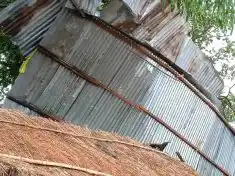
A devastating storm swept through Chiyimba Village in Ntchisi District on Thursday afternoon, leaving a trail of destruction. Over 40 homes were flattened, and two people sustained injuries, forcing them to seek medical care at Chinkhande Health Centre.
The storm, which struck around 3 PM, came with ferocious winds that tore roofs off houses, toppled trees, and scattered debris across the village. Blessings Mandimu, Chairperson of the Chimwala Development Committee, described the storm as one of the worst disasters to hit the area in recent years.
“Many families have been left without shelter and food as their roofs and food supplies were destroyed,” Mandimu told Times 360 Malawi. He added that the affected residents now face an uncertain future, with most of their belongings buried under the rubble or completely ruined by the torrential rain.
Chiyimba Village, nestled under the authority of Traditional Authority Vuso Jere, is reeling from the disaster. The storm has not only displaced families but also exposed the vulnerability of rural communities to extreme weather events. Children, the elderly, and other vulnerable groups are among those hardest hit.
One victim, recounting the ordeal, said the winds “sounded like a roaring lion,” forcing them to flee for safety as their house collapsed.
Member of Parliament for the eastern part of Ntchisi, Benard Chitekwe, expressed deep concern over the incident. “I have reached out to the Department of Disaster Management Affairs (DODMA) to assess the damage and provide relief,” he said.
DODMA’s immediate response is expected to include temporary shelters, food supplies, and other emergency provisions. However, Chitekwe called for long-term measures to mitigate the impact of such disasters, including improved infrastructure and better disaster preparedness.
This storm is a grim reminder of the growing frequency and intensity of extreme weather events in Malawi. Communities like Chiyimba Village, which rely on subsistence farming, are particularly vulnerable. With crops destroyed and food reserves depleted, the impact of this storm is likely to extend far beyond immediate shelter needs.
Mandimu emphasized the urgent need for support.
“These families need help—food, clothes, and materials to rebuild their homes. Without intervention, this disaster could have lasting effects,” he said.
The storm’s aftermath has galvanized local leaders and community members to come together to support those affected. However, the scale of destruction requires coordinated efforts from the government, NGOs, and the private sector.
As the people of Chiyimba Village begin the slow process of rebuilding, this tragedy underscores the importance of investing in disaster resilience and preparedness. The storm may have passed, but its impact will be felt for weeks, months, and perhaps years to come.
For now, the hope lies in swift action from authorities and the generosity of Malawians to help these families regain their footing.






0 Comments